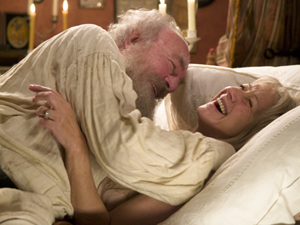 By Sara Shereen Bakhshian
By Sara Shereen Bakhshian
May contain spoilers
The new Sony Pictures Classics’ biopic “The Last Station,” opens with the Leo Tolstoy quote “Everything I know, I know only because I love.” The film chronicles the last year of the life of the acclaimed novelist, where he and his circle of family and friends debate the meaning of love and life.
The Michael Hoffman film is set in 1910 Russia, after the renown author of “War and Peace” and “Anna Karenina” has given up aristocracy–or tries to anyway. Tolstoy (Christopher Plummer) relinquishes his count title and creates a new religion with beliefs in celibacy and vegetarianism and against personal wealth. But he continues living on the family estate, Polyana, waited upon by servants and, in at least one scene with his wife, Countess Sofya (Helen Mirren), ignores his celibacy vow. But Tolstoy himself wasn’t afraid to admit that he wasn’t the best Tolstoyan.
The cast of characters that Tolstoy surrounds himself is most entertaining.
There’s the dutiful and dramatic Countess Sofya, who copied “War and Peace” for her husband six times. Her enemy is Tolstoy’s highest disciple, Vladimir Chertkov (Paul Giamatti), who wants the novelist to leave the rights of his works to the Russian people rather than the Tolstoy family. The newcomer to the circle is Valentin Bulgakov (James McAvoy), Tolstoy’s devoted secretary.
While Sofya wants to protect the family, her eccentricity makes it difficult for others to support her. And Chertkov is using the literal interpretations of the Tolstoyan faith to push his own agenda. Meanwhile both are trying to get Bulgakov to spy on the other.
It is Bugakov’s journey as a hero that drives the film. Despite entering the group as an eager Tolstoyan, ready to learn all that he can, it is he who ends up teaching Tolstoy and the audience. One of his major dilemmas is that he needs to figure out whether he wants to live with an ideal love depicted in the Tolstoyan faith, or the romantic notion of love with co-religionist Masha (Kerry Condon).
Through Bugakov the audience learns about the intricacies of the new religion and how the resulting community practices it. He witnesses the Tolstoys’ awkward marital arguments on more than one occasion. And he has a pure and sensual love with Masha that leads him to question his beliefs.
Bugakov’s dilemma is almost universal in the film: Can a romantic love like this last? He came in with the belief that a celibate kind of love was the ideal, but left with a wildly different notion.
It’s been 100 years later since the film’s setting, and the current discourse on love doesn’t seem that different. From new to old religious movements, there have been various definitions of love, family and the like. And still many individuals decipher between practicing in tune with a respective organized religion or following their own spiritual path.
“The Last Station” opens in Los Angeles and New York on Jan. 15 and has an upcoming nationwide release.
Photo: Stephan Rabold, Courtesy of Sony Pictures Classics


